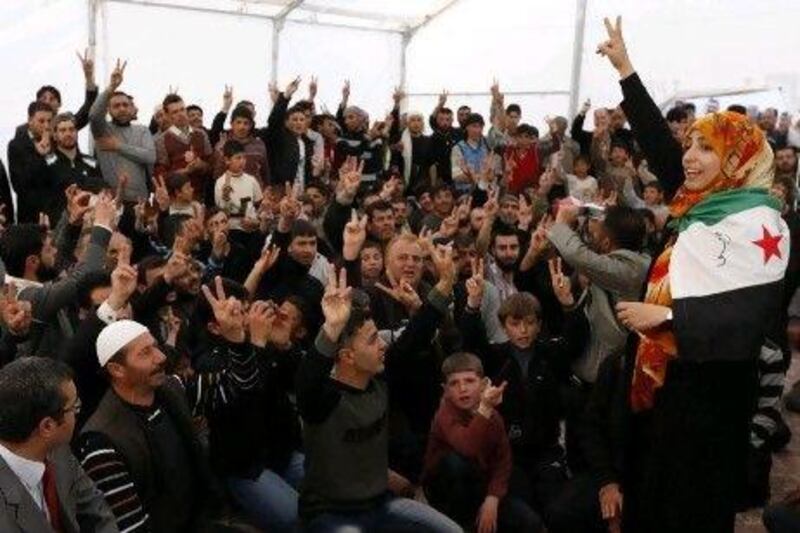REYHANLI, TURKEY // Two more generals defected to the Syrian rebel army yesterday as the military battle against President Bashar Al Assad's regime gained momentum.
Rare gun battles between security forces and rebels broke out yesterday in an upmarket Damascus neighbourhood where embassies are located and senior officials live.
It was one of the most serious confrontations in the tightly controlled capital since the anti-government uprising began a year ago.
The clash, which left at least three people dead, was a show of force by the opposition fighters, who recently suffered several major setbacks when they were driven out of strongholds in the northern city of Idlib and the central city of Homs.
It demonstrated that they can strike at the heavily guarded heart of the capital.
Nine generals have now joined the Free Syrian Army, which is based in neighbouring Turkey under the protection of Turkish authorities. And more and more Syrians want to take up arms against the government and its forces, who have been accused of killing at least 8,000 civilians in the past year.
When the uprising started, Malek Hacisuleyman was a construction worker raising a young family in the north-western province of Idlib.
Today, he is a jobless refugee in at a camp in Reyhanli, Hatay, a province that borders Syria. But he is ready to go back to Syria and take up arms in a bid to drive Mr Al Assad from power.
"Send your armies into Syria or give us weapons, so we can go back ourselves," Mr Hacisuleyman, 27, said yesterday.
Mr Hacisuleyman and other men in the camp said they did not think that diplomatic efforts to solve the conflict in Syria would work.
The latest mediation mission by the special envoy of the United Nations and the Arab League, Kofi Annan, failed to end the violence.
Statements by Turkey's government about a possible buffer zone within Syria have increased speculation about a foreign intervention.
Recep Tayyip Erdogan, the Turkish prime minister, last week said his government was looking at different options, including the creation of a buffer zone in Syria - a suggestion that refugees in Reyhanli applauded.
"That's what we want as well," said Abdulkadir Fayzi, a farmer from Idlib who said he returned to Syria regularly to bring friends and members of his extended family over the border into Turkey.
Turkey says it may have to step in to avert a possible further steep rise in the number of refugees from Syria. About 16,000 Syrians have so far arrived, but the head of the Turkish Red Crescent last week said that up to half a million more could flee.
Turkish officials are especially worried about the latest fighting and bomb attacks in Idlib and Aleppo, Syria's biggest city with more than two million people. A further deterioration in those areas could send many more refugees into Turkey, which borders the regions of Idlib and Aleppo.
In the refugee camp of Reyhanli, one of half a dozen in southern Turkey, officials said numbers had risen quickly during the past few weeks.
"A month ago, this camp housed 1,300 people," one official said, speaking on condition of anonymity because he was not authorised to comment publicly. "Today, we have 4,000." Four out of five refugees in Reyhanli come from Idlib, he said.
The camp consists of hundreds of white canvas tents of the Turkish Red Crescent and a fewer number of green tents from the UN High Commissioner for Refugees. The camp has running water and electricity, a mosque and a post office.
Yesterday, women carried baskets with freshly washed clothes towards their tents as some children played basketball under the instruction of a Turkish volunteer teacher. Others sang Turkish nursery rhymes in front of a corrugated iron building marked as a school.
Several refugees said there were many people on the other side of the border who could come over to Turkey any time.
"There is no water, no electricity," said Mr Fayzi, the farmer from Idlib. "There is shooting, and you don't know where it comes from."
Mr Hacisuleyman said he decided to take his young son and his wife, who was pregnant at the time, over the border into Turkey when he saw Syrian security forces kill civilians last June. His daughter was born in the camp in Reyhanli.
"Tanks started shooting," Mr Hacisuleyman said about events that drove him to flee his country.
"I saw one man who was killed by gunfire while he was just walking down the street. They are insane," he said about the Syrian government forces.
Even though he is glad his family is safe, Mr Hacisuleyman does not want to stay in Turkey.
"All we have is over there," he said, gesturing to the next hill outside the camp where a barbed wire fence marked the border with Syria.
Sometimes, men from the camp can earn a little money as day labourers for local Turkish farmers, but such jobs are rare.
Other refugees in the camp echoed Mr Hacisuleyman's call for arms.
"God willing, he will be gone in three or four months," Mr Fayzi, the farmer, said about Mr Al Assad.
Haled Malawi, a lorry driver who is still on crutches after being hit by five bullets in the leg and upper body during a clash between security forces and opposition activists last year, said the international community should help the opposition in Syria.
"Everybody is only thinking about going back," he said. "Give us weapons, then we go."
Ahmed Basto, another refugee wounded in the uprising, said he would go "today" if there was a chance to fight against Mr Assad's forces. "We all are ready to go."
Many refugees expressed support for the Free Syrian Army (FSA), the armed opposition force established by Syrian army deserters. Several men said they were smuggled out of Syria with the help of the FSA. But there was no sign of recruitment or training for the FSA in the camp.





